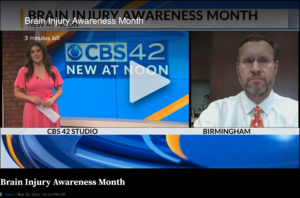Brain Injury Awareness Month
March is Brain Injury Awareness Month, and it is a good time to learn more about traumatic brain injury (TBI). TBI is any blow or trauma to the head that disrupts normal brain function. The severity of TBI can range from mild, such as a concussion, to moderate, which may require hospitalization, to severe, which can cause a person to fall into a coma. Common causes of TBI include falls, motor vehicle collisions, sports-related injuries, and even gunshot wounds to the head.
Philip C. Maher, MD, at Saint Vincent’s Birmingham and Neurosurgical Associates PC, explains that long-term side effects of TBI can be both physical and cognitive. Physical symptoms may include sleep disturbances, chronic headaches, ringing in the ears, and sensitivity to light. Cognitive symptoms may include memory impairment, loss of attention span, and difficulty with problem-solving. These symptoms can be very debilitating and require rehabilitation to mitigate them.
While it is not always possible to predict when a TBI may occur, taking preventative measures can help. Wearing a helmet while participating in sports or riding a bike is an essential preventative measure. However, it is not just young people who need to protect their heads. Falls are the most common cause of TBI in those over the age of 65, especially in those who are on blood thinners, which makes head injuries more severe. Therefore, it is crucial to ensure that homes are well-lit, free of clutter, and have handrails installed, particularly in areas such as bathrooms where falls are most likely to occur.
In conclusion, understanding TBI and taking preventative measures can help reduce the number of traumatic brain injuries that occur. Whether it is wearing a helmet while cycling, making homes safer for the elderly, or simply being aware of the potential risks of head injuries, it is important to do what we can to protect ourselves and those around us.
Video and Content Source: You can watch Dr. Maher’s interview with CBS42 here.

